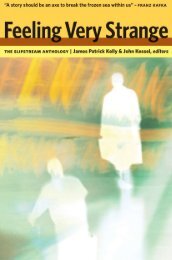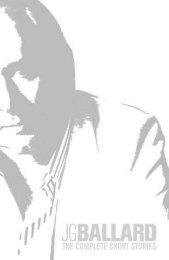The Curse of the Wer.. - Site de Thomas - Free
The Curse of the Wer.. - Site de Thomas - Free
The Curse of the Wer.. - Site de Thomas - Free
You also want an ePaper? Increase the reach of your titles
YUMPU automatically turns print PDFs into web optimized ePapers that Google loves.
A MANIFESTO FOR WEREWOLVES<br />
In this frieze <strong>of</strong> imagery, <strong>the</strong> magical, accelerated process <strong>of</strong> individuation<br />
experienced by <strong>the</strong> werewolf Messiah is accompanied by rapid shifts<br />
<strong>of</strong> wea<strong>the</strong>r and season, suggesting that <strong>the</strong> project <strong>of</strong> selfhood, while<br />
important in its own right, is also indissolubly linked to nature.<br />
In this sense, this passage owes much to <strong>the</strong> romantic conceptualization<br />
<strong>of</strong> <strong>the</strong> sublime, in which spiritual enrichment is attained<br />
through an immersion in or connection with nature. This focus on<br />
<strong>the</strong> inter<strong>de</strong>pen<strong>de</strong>ncy <strong>of</strong> ‘spirit’ and nature is common in fantasy, in<br />
which protagonists frequently achieve spiritual fulfilment through<br />
intimacy with nature. New Age philosophy also tends to draw on<br />
such associations, as in alt.horror.werewolves participants’ notion<br />
<strong>of</strong> ‘spiritual <strong>the</strong>rianthropy’, which is explained as an experience <strong>of</strong><br />
connection with <strong>the</strong> animal world, which ‘contacts us through totems,<br />
through dreams, through our very souls’. 50 In more critical contexts,<br />
critiques <strong>of</strong> mo<strong>de</strong>rnist subjectivity (with its emphasis on reason — ‘I<br />
think’ — ra<strong>the</strong>r than spirit) have also led to a resurgence <strong>of</strong> interest in<br />
spirituality, <strong>de</strong>spite an ingrained resistance to <strong>the</strong> discussion <strong>of</strong> such<br />
<strong>the</strong>mes in <strong>the</strong> discourses <strong>of</strong> rationalist science.<br />
In<strong>de</strong>ed, as Philippa Berry observes, some recent <strong>the</strong>orizing has<br />
begun to present ‘a new un<strong>de</strong>rstanding <strong>of</strong> spirit, not as <strong>the</strong> opposite<br />
term <strong>of</strong> a binary couple, but ra<strong>the</strong>r as facilitating a wholly new mo<strong>de</strong> <strong>of</strong><br />
awareness’, an awareness ‘which not only invites <strong>the</strong> thinker to abandon<br />
<strong>the</strong>ir residual attachment to dualistic thinking, but also <strong>of</strong>fers a potent<br />
challenge to <strong>the</strong>ir <strong>de</strong>sire for subjective mastery and knowledge’. 51 In<br />
such contexts, spirituality, like <strong>the</strong> werewolf, draws attention to <strong>the</strong><br />
impossibility <strong>of</strong> separating nature from culture, <strong>the</strong> human person<br />
from <strong>the</strong> subject. A return to Žižek’s reading <strong>of</strong> Friedrich Wilhelm<br />
von Schelling’s work can suggest how spirituality operates in this way;<br />
for Žižek, Schelling’s <strong>de</strong>claration that ‘Nature is visible Spirit, Spirit<br />
is invisible Nature’ called attention to a ‘double surplus that “sticks<br />
out”’; <strong>the</strong> fact that <strong>the</strong>re is a ‘spiritual element <strong>of</strong> corporeality’, but<br />
also a ‘corporeal element <strong>of</strong> spirituality’. 52 In this sense, discourses<br />
about spirituality register <strong>the</strong> absurdity <strong>of</strong> <strong>the</strong> Enlightenment attempt<br />
to divorce <strong>the</strong> subject or ‘I think’ from <strong>the</strong> body or human person,<br />
by insisting on <strong>the</strong>ir connectivity. Accordingly, just as <strong>the</strong> ‘spectral’<br />
143





